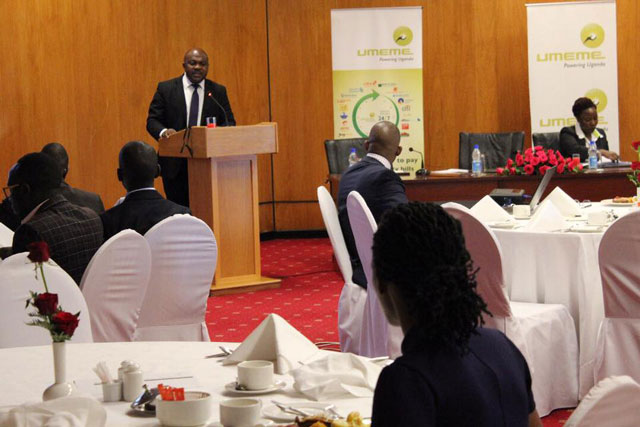
UMEME: Company fails to win court case against ERA, writes off Shs115.3bn from its balance sheet
Kampala, Uganda | JULIUS BUSINGE | Electricity distributor, Umeme Limited, recorded a first ever loss since it listed its shares on the Uganda Securities Exchange and the Nairobi Secures Exchange five years ago.
The firm’s latest financial performance shows that it registered a Shs47.5bn net loss during the first half of this year ending June 30, down from Shs54.4bn net profit registered in the same period in 2016.
Selestino Babungi, the managing director for Umeme told business analysts and journalists at the Kampala Serena Hotel on Oct.04 that the loss resulted from the industry regulator, Electricity Regulatory Authority, move to amend the former’s operating licence to deny them [Umeme] of extra income from sale of extra units of electricity beyond the set target.
This prompted Umeme’s top management, which had since 2012, been including the expected extra income from the regulator in their income statement to record it as impairment provisions in accordance with international accounting standards. This expected extra income was technically referred to as growth factor revenues that had income tax and appeals or court fees components.
The expected gross factor revenue as at the end of June 30, 2017, stood at Shs115.3bn.
“Umeme still believes that it is entitled to this revenue and is pursuing its recovery…,” Babungi said.
This development comes barely five months since Umeme and ERA signed a consent judgment that gave birth to the amendment Number 5 to the Umeme Limited License to operationalise the 2012 amendments by ERA. This followed a long legal battle that ended when the two parties agreed to settle the matter out of court.
New amendments to remain
But an official familiar with the matter at ERA told The Independent in an interview that the government will not give Umeme any money as income under the new license.
Instead, Umeme will utilise revenues (if any) that may arise from reconciliations of energy purchases to invest it in the power grid to benefit electricity consumers and support government’s move to connect more Ugandans to the national grid.
Also, the investments made using reconciled revenues and grant financing shall not form part of Umeme’s assets, earn returns and the electricity distributor shall earn a reasonable management fee for investing the reconciled amounts that would be contained in the end-user tariff.
“The Amendment does not affect Umeme Limited work of distributing electricity to Uganda…it supports Umeme and the sector’s effort to accelerate power connections to unserved and underserved sections of the population,” the official, who preferred not to be named said.
The official said the amendment No. 5 is already part and parcel of the tariff methodology and thus, it will have no direct impact on the end-user tariffs.
The official, however, said the amendment is expected to reduce the investment related costs than it would have been if the amendment was not operationalised. This, the official said, is based on the fact that increased energy consumption arising from accelerated connections will lead to lower tariffs and improved welfare to the households.
One-off loss
In an interview with The Independent, Umeme’s chief finance officer, Marie Nassiwa Martin said that this impairment provision (Shs 115.3bn) is a one-off and is not expected to adversely affect the company’s profitability going forward.
Nassiwa added that the impairment provision is not a cash flow item and is not expected to affect the company’s ability to meet its short – long term obligations.
“We are still having discussions with the regulator, the ministry of energy to see how these revenues can be brought back,” she said, adding from the accounting perspective, these discussions can happen but the amounts have become uncertain and so we have to make a provision.”
Meanwhile, the company incurred costs while in court. On this matter, Nassiwa said that at the time of the consent judgment it was agreed that Umeme settles the legal costs including those for the regulator’s lawyers and the regulator would provide for these costs in the end-user tariff.
“Now they have not yet done that,” she said adding, “we are still negotiating on the mechanism of getting it back but for accounting purposes we have to make a provision for that also.”
 The Independent Uganda: You get the Truth we Pay the Price
The Independent Uganda: You get the Truth we Pay the Price



